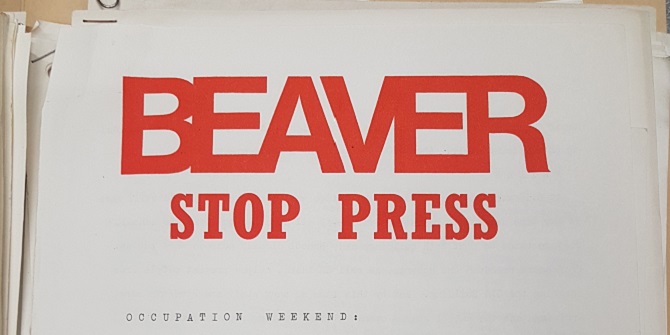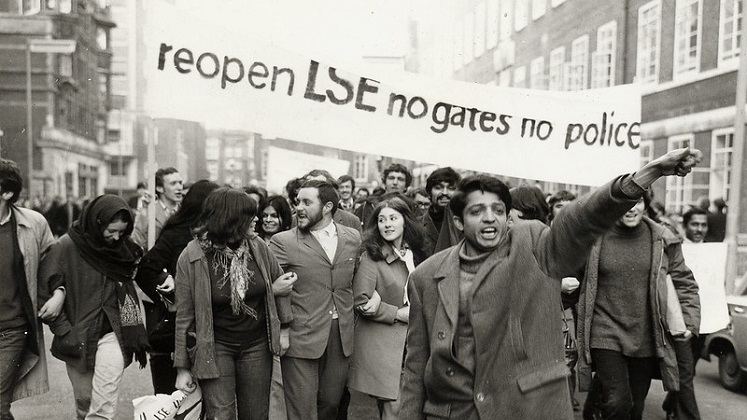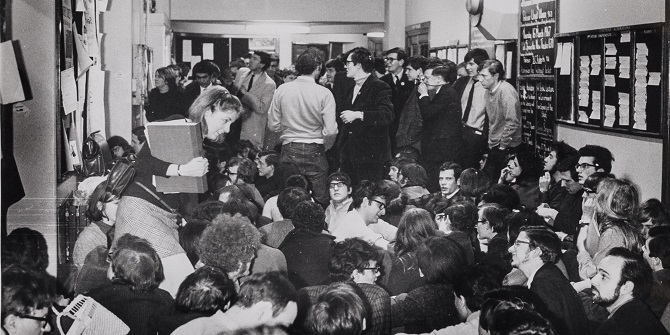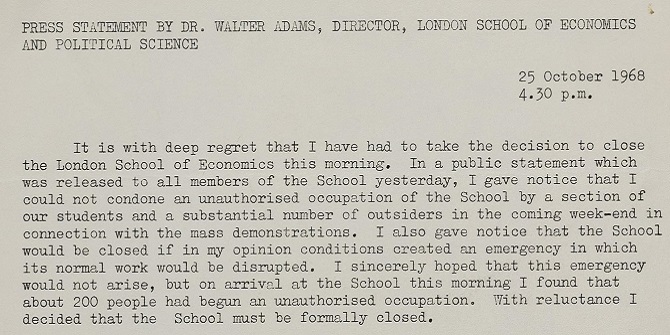In 1974, the National Union of Students’ No Platform policy was introduced on the same day as the death of a Warwick student at a demonstration in London. LSE Archivist Lisa McQuillan heads to our Library archives to explore how students respond to turbulent political climates, from the 1970s to the present day.

15 June 2024 marks the 50th anniversary of the death of Warwick university student Kevin Gately, in 1974, at an anti-fascist demonstration in London, not far from the LSE campus. The same day, the National Union of Students (NUS), emboldened by news from the demo, passed a motion to bring in a No Platform policy, which is still in place and which ignited an ongoing debate on free speech in universities that is still causing tensions today.
Gately was 20 years old and attending his first demonstration, protesting a National Front event at Conway Hall in Red Lion Square. He got caught up in violent clashes with the police and when the crowd subsided was found unconscious; the exact cause of his death has never been established. The NUS meeting happening in London at the same time was a second emergency meeting to vote on a No Platform policy for NUS events. This policy caused divisions among students, both conceptually and in terms of its practical application – especially regarding the extent to which disruptions should occur at events not organised by the NUS.
Throughout the late 1960s and early 1970s, the domestic confrontation between anti-immigrant, and often racist, factions in British society and the anti-fascist movement had intensified. The No Platform policy was an attempt by the NUS to draw a line between the right to free speech and protection from racist views and incitement to hatred.
This policy only applied to national level events. Individual Student Unions could choose whether to adopt the policy or not; it was not immediately adopted by LSE Student Union. The LSE Director’s report noted this in 1974:
…despite the possibility of rent-strikes in the future, there were good relations with the student body, whose seriousness and commonsense was mis-represented by such issues as the NUS policy on denying free speech to alleged racists. (LSE/MINUTES/4/1/21)
No mention was made in the report of the death of a student that year in an anti-racist demonstration, albeit a student from another university.
International political issues such as the campaign against apartheid in South Africa, and the colonial regime in Rhodesia, also saw protests on student campuses, as well as those in response to issues which directly affected students such as student finance. The “LSE Troubles” in the late 1960s have been written about extensively but protests continued through the 1970s and 1980s, including a campus occupation in 1977 against student fee increases and a protest against apartheid in South Africa in 1987.

It is difficult to avoid drawing a parallel between the 1987 occupation and the 2024 student protests, both being centred around the issue of LSE investments and their link to political and human rights issues. Students were calling for LSE to boycott companies linked to South Africa as part of a broader campaign to bring international sanctions on the South African government until they ended apartheid. Alongside the divestment movement, there were also frequent protest and disruptions of events with people seen as supporters or apologists for apartheid, and those with anti-immigration views. This included members of the Conservative Party who were obviously elected representatives, raising concerns among some students and staff about the issue of free speech.
In 1978 Keith Joseph, who was in Margaret Thatcher’s shadow cabinet at the time, was barred by the LSE Students’ Union from speaking at an event after his refusal to sign an advance statement in favour of immigration. He was then invited back to LSE to speak by Director Ralf Dahrendorf. The opposition from some students to the Students’ Union’s application of the No Platform policy can be seen in the poster below:

It would be the same Keith Joseph, now Education Secretary in the Conservative government, who oversaw the introduction of the Education (No 2) Act 1986 , which contained Section 43 on Freedom of speech in universities, polytechnics, and colleges. For the first time this legislated the protection of freedom of speech for university lecturers, staff, students, and those invited to speak at universities. It did not specify, however, how universities were to achieve this in practice.
LSE’s various committees discussed how to implement the legislation and drafted a Code of Practice. There was discussion about the extent to which heckling is an accepted part of academic debate, and about where heckling tipped over into disturbance. Discussion noted that the School’s 1902 constitution had already committed LSE to the protection of academic freedom. Many universities felt that their core ethics rested on academic freedom, and they didn’t need legislative intervention. The adopted Code of Practice contained clauses which were still subjective in nature concerning the boundaries between free speech and incitement to racial hatred:
In particular, the School authorities will take into account the provisions of the Public Order Act 1986 which describe the circumstances in which a person … may be guilty of an offence if he or she intends to stir up racial hatred or if, having regard to all the circumstances, racial hatred is likely to be stirred up. LSE Court of Governor Minutes 1987 (LSE/MINUTES/4/1/25)

The personal response from the General Secretary of the LSE Student Union was that the School was directing its energies in the wrong place:
… the sentiment of most of the Union, is that the School should spend more time fighting the growing tide of racism within the college rather than protecting those guilty of organising racist and provocative meetings. – LSE Court of Governor Minutes 1987 (LSE/MINUTES/4/1/25)
Later in 1987 there was an occupation of Connaught House on campus by 200 to 300 students for over two weeks in a continuation of their long campaign against LSE’s investments in South African companies.
Since then, the application of No Platform policies has broadened to encompass different types of perceived hate speech including homophobia, transphobia, antisemitism, and islamophobia, and has waxed and waned in student consciousness in relation to wider sociopolitical events in Britain and around the world. Student protests on the LSE campus have included teach-ins protesting the invasion of Iraq in 2002 and a sit-in in 2009 protesting Israel’s attacks on Gaza.

In 2021 the Conservative government set about strengthening free speech legislation further, resulting in the Higher Education (Freedom of Speech) Act 2023, extending it to include student unions. This has prompted the same debates and confrontations as in the 1980s about the nature of free speech, definitions of hate speech, and questions about the purpose and ownership of university campuses, which will no doubt continue.





